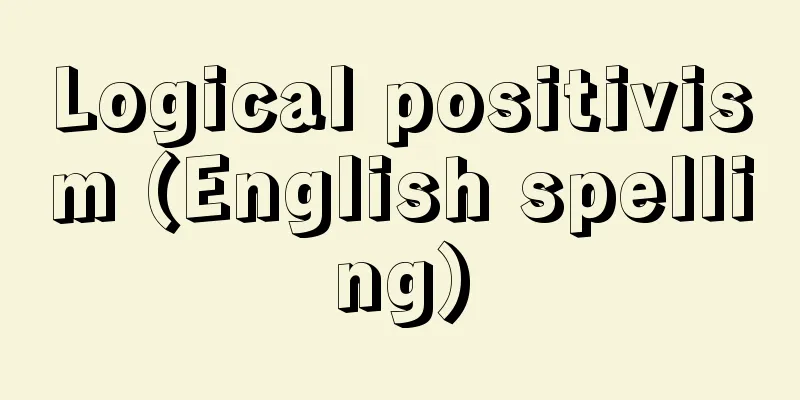Logical positivism (English spelling)

|
This term refers to the ideas of the Vienna Circle and its close associates, such as Reichenbach of the Berlin School and Ayer of England. After the Vienna Circle was dissolved and Wittgenstein began to value everyday language over artificial language, the ideas of the former logical positivists often changed significantly. The ideas after this change are called analytic philosophy, but even today, philosophers with a different tendency from analytic philosophy seem to use the term "logical positivism" to include analytical philosophy. In fact, logical positivists do not like partisanship or systematicity, so it is difficult to summarize their ideas in one word, but their common characteristics are that they value empirical science, emphasize methods of linguistic analysis, and are negative about metaphysics. There are also analytical philosophers in the United States and other countries who still emphasize the role of artificial language, and they are sometimes called logical reconstructionists. Now, many of the logical positivists who lived before analytical philosophy were fascinated by the success of Russell's logician theory of mathematical foundations at that time, and they argued that all propositions are divided into so-called "analytical propositions," whose correctness is determined uniquely only by the structure of the proposition, and "synthetic propositions," whose correctness requires experience to be determined, that the distinction between these two types of propositions is not necessarily clear when expressed in ordinary language, but if one tries to express everything in an artificial language obtained by adding a few appropriate predicate symbols to logical symbols, this distinction becomes immediately clear from the form of the expression of the proposition, and that propositions that cannot be expressed in this artificial language lack substantial content even if they can be written in ordinary language. Because they were hasty in their argument, they were criticized for their dogmatic and inconsistent points. After the annexation of Austria by Nazi Germany, the Vienna Circle was politically oppressed and dissolved, but many people believe that even without such external circumstances, logical positivism was destined to perish because of the dogmatic and inconsistent points mentioned above. In fact, some former logical positivists did point out these two flaws. However, in the 1950s, a group of French mathematicians started to steadily realize one of the programs of the logicist foundations of mathematics, which is to define mathematical concepts using only the concepts of set theory, in a more thorough way than Russell and his colleagues. Since then, the idea of expressing many things in artificial languages has gained strength in fields other than philosophy. One of the results of this trend being imported back into philosophy is the aforementioned logical reconstructionism, centered in the United States. Furthermore, after the advent of computers, cognitive science was born, which seeks to describe the workings of the human mind using language that computers can process. Language that computers can process is, in the end, nothing other than logical artificial language. Moreover, the potential uses of computers are unexpectedly large, so many people predict that most of the things that have been done using everyday language up until now can be transferred to artificial language. These facts are sometimes referred to as the "revival of logical positivism." At the very least, it is worth reexamining the claims of this doctrine in light of the contemporary situation. [Yoshida Natsuhiko] “AJ Ayer ed.Logical positivism (1959, The Free Press)” [References] | | | | | |Source: Shogakukan Encyclopedia Nipponica About Encyclopedia Nipponica Information | Legend |
|
ウィーン学団およびこれと近い関係にあったベルリン学派のライヘンバハ、イギリスのエイヤーらの思想をさすことば。ウィーン学団が解散し、またウィットゲンシュタインが人工言語よりも日常言語を重んずるようになってから、かつての論理実証主義者の思想も大きく変わった場合が多い。この変化後の思想を分析哲学とよぶが、いまでも、分析哲学とは違った傾向の哲学者は、分析哲学まで含めて、「論理実証主義」という呼び名を使うようである。実は、論理実証主義者は党派性や体系性を好まないので、その思想内容をひと口にまとめていうことはむずかしいが、経験科学を重んずること、言語分析の方法を重視すること、形而上(けいじじょう)学に対して否定的であることが、共通の特色であるといえよう。また、現在でもなお人工言語の役割を重視する分析哲学者がアメリカなどにいて、彼らは論理的再構成主義者とよばれることがある。 さて、分析哲学より前の論理実証主義者の多くは、当時のラッセルたちの論理主義の数学基礎論の成功に目を奪われ、命題はすべてその正しさが命題の構造だけから一義的に決まるもの、いわゆる「分析的命題」と、その正否の決定に経験が必要な「総合的命題」とに分かれること、この2種類の命題の区別は、普通の言語表現による場合はかならずしもはっきりしないが、論理記号に適当に述語記号をいくつか付け加えて得られる人工言語によってすべてを表現しようとすれば、この区別は命題の表現の形からただちに明らかになること、また、この人工言語で表現できないような命題は、普通のことばでは書くことができるにしても実質的な内容を欠くものであること、を主張した。その主張の仕方が性急であったため、独断的な点、不整合な点を指摘されることになった。ウィーン学団はナチス・ドイツによるオーストリアの合併以後、政治的な弾圧を受けて解散状態になったが、そのような外的事情がなくとも、いま述べた独断性と不整合性のゆえに、論理実証主義は滅びる運命にあったのだと考える人も多い。事実、かつての論理実証主義者のなかに、この二つの欠点を指摘する批判者が現れたのだった。 しかし、1950年代になり、フランスの数学者の一団が、論理主義数学基礎論のプログラムの一つ、数学の諸概念を集合論の概念だけを用いて定義することを、ラッセルたちよりも行き届いた形で着々と実現し始めてから、人工言語によって多くの物事を表現しようとする考え方は、哲学以外の分野で力を得るようになった。この傾向の哲学への逆輸入の結果の一つが、先に述べた、アメリカを中心とする論理的再構成主義である。 また、コンピュータの出現以後、コンピュータに処理できることばで人間の心の働きを記述しようとする認知科学が誕生した。コンピュータに処理できることばとは、結局、論理的な人工言語にほかならない。しかも、コンピュータの利用の可能生は予想外に大きいので、いままで日常言語を使って行われてきたことの大部分は人工言語に移せるのではないかと予想する人も多い。 このような事実をさして、「論理実証主義の復興」ということがある。少なくとも現代の状況に照らしてこの主義の主張を再吟味することには意味があるとはいえよう。 [吉田夏彦] 『A. J. Ayer ed.Logical positivism (1959, The Free Press)』 [参照項目] | | | | | |出典 小学館 日本大百科全書(ニッポニカ)日本大百科全書(ニッポニカ)について 情報 | 凡例 |
Recommend
Almqvist - Carl Jonas Love Almqvist
Swedish author. Born November 28th in Stockholm. ...
Preface to the Educational System
…Thus, it was drafted in a very short time and en...
Conquest of Choshu
The Tokugawa shogunate dispatched troops to the C...
Keijun Miyabe
Year of death: March 25, 1599 (April 20, 1599) Yea...
Convention Concerning the Rights and Obligations of Neutral Powers in Case of Naval Warfare
…After the war, the United States claimed damages...
Périgord (English spelling)
The name of the region in the southwest of France,...
Masonry construction - Sosekishikikozo (English spelling)
The main structure of a building is constructed by...
Electroencephalogram
(1) Electroencephalogram (EEG) is a recording, oft...
Nitrate bacteria
Nitrobacter is a type of bacteria that oxidizes ni...
Eyalet - Eyalet
…In order to realize flexible governance accordin...
Sleeping Beauty - Slyashaya krasavitsa; The Sleeping Beauty
A ballet consisting of a prologue and three acts a...
County
A county is a unit of local government found in th...
High-speed car
A Turkic northern nomadic tribe that appeared in ...
Arinostride - Arinostride
...It is said that in return for providing a home...
Akiyoshi Marble
The name of limestone from the Carboniferous to Pe...









